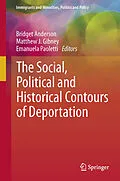In recent years states across the world have boosted their legal and institutional capacity to deport noncitizens residing on their territory, including failed asylum seekers, "illegal" migrants, and convicted criminals. Scholars have analyzed this development primarily through the lens of immigration control. Deportation has been viewed as one amongst a range of measures designed to control entrance, distinguished primarily by the fact that it is exercised inside the territory of the state. But deportation also has broader social and political effects. It provides a powerful way through which the state reminds noncitizens that their presence in the polity is contingent upon acceptable behavior. Furthermore, in liberal democratic states immunity from deportation is one of the key privileges that citizens enjoy that distinguishes them from permanent residents. This book examines the historical, institutional and social dimensions of the relationship between deportation and citizenship in liberal democracies. Contributions also include analysis of the formal and informal functions of administrative immigration detention, and the role of the European Parliament in the area of irregular immigration and borders. The book also develops an analytical framework that identifies and critically appraises grassroots and sub national responses to migration policy in liberal democratic societies, and considers how groups form after deportation and the employment of citizenship in this particular context, making it of interest to scholars and international policy makers alike.
Inhalt
1. Introduction - Bridget Anderson (University of Oxford), Matthew Gibney (University of Oxford) and Emanuela Paoletti (University of Oxford).2. Muslims and US deportation and exclusion policies - the 1910 polygamy controversy - Deirdre Moloney (Princeton University) 3. Deportations, quarantines, and other fantasies of foreigner control in the Weimar Republic - Annemarie Sammartino (Oberlin College)4. Negotiating Deportations; an ethnography of the legal challenge of deportation orders in a French Immigration Detention Centre - Nicholas Fisher (Ecole des Hautes Etudes en Sciences Sociales)5. A case of mixed motives? Formal and Informal Functions of Administrative Immigration Detention - Arjen Leerkes and Dennis Broeders (Erasmus University)6. The European Parliament and the 'Returns' directive: The end of radical contestation; the start of consensual constraints? - Ariadna Ripoll Servent (University of Sussex) 7. It is for the government to control and manage undocumented! - Michela Semprebon (University Milano Bicocca)8. Studying migration governance bottom-up - Catherine Dauvergne (University of British Columbia), Antje Ellermann (University of British Columbia), and Matthew Gravelle (University of British Columbia)9. From the migrants civil destitution to their self-organisation into transitory national communities: the remains of citizenship in post-deportation experiences in Northern Mali - Clara Lecedet (Ecole des Hautes Etudes en Sciences Sociales)
